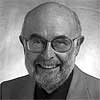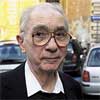
|
||
|
||
|
Thursday, February 10, 2005
Roger Haight, SJ and the Debate over Religious Pluralism
 Zenit.com reports that the Congregation for the Doctrine of the Faith has finally published a notification concerning Jesuit Rogert Haight's book Jesus: Symbol of God, concluding that it contains grave doctrinal errors against the divine and Catholic faith of the Church," and as a consequence barring the priest from teaching "as long as his positions are not rectified so as to be in full conformity with the doctrine of the Church." [Source: "Jesuit Roger Haight's Book Has 'Grave Doctrinal Errors'" Zenit.org Feb. 8, 2005]. Zenit.com reports that the Congregation for the Doctrine of the Faith has finally published a notification concerning Jesuit Rogert Haight's book Jesus: Symbol of God, concluding that it contains grave doctrinal errors against the divine and Catholic faith of the Church," and as a consequence barring the priest from teaching "as long as his positions are not rectified so as to be in full conformity with the doctrine of the Church." [Source: "Jesuit Roger Haight's Book Has 'Grave Doctrinal Errors'" Zenit.org Feb. 8, 2005].
As some might say, "it's about time!" -- Haight confirmed that he was under investigation by the Vatican in 2000. What follows is a history of the affair:
Lest anybody doubt whether the Vatican's concern over Haight's Christology is warranted, I invite my readers to check out blogger Oswald Sobrino's analysis -- no pun intended -- of Haight in Christology and Other World Religions, by Oswald Sobrino. Oct. 6, 2003. In addition, here's an excerpt from Fr. Edward T. Oakes, S.J.'s excellent article "Reconciling Judas: Evangelizing the Theologians" Crisis October 2004): Jesus: Symbol of God perfectly illustrates Catholic theology's recent declension from gold to whetstone. What follows is a kind of catena of citations from the book -- a catena plumbi, as it were -- to show what I mean:
In other words, the resurrection of Jesus differs in no fundamental way metaphysically from the way Dr. Martin Luther King Jr. or Mahatma Gandhi continue to live on in the memory of those who have been inspired by their respective messages. With a thesis like this now afloat in the professional journals, theology has clearly reached the point where it thinks it can bargain with modern unbelief using a whetstone for legal tender. What Father Haight has given us, in effect, is a christology equally suitable to the followers of the slain Beatle, John Lennon, whose fans gather each year at Strawberry Fields in New York's Central Park (their Golgotha) on the anniversary of his assassination (their Easter), fondly recall his memory, proudly affirm that his message is true, and recognize him for the forceful impact he had on people (as he once blurted out to a reporter when he was on tour in South Africa, and to immense controversy, "We're more popular than Jesus"). And as Fr. Neuhaus quipped in "The Public Square": Roger Haight's Jesus Symbol of God (Orbis) is reviewed in America by Elizabeth Johnson of Fordham. She celebrates the author's postmodernist reconstruction of Christology, adding only that in a time of religious pluralism, "To say that Jesus is the symbol of God implies that he is this for Christians." Yes, and for everyone else, as is emphasized in the 1990 encyclical Redemptoris Missio, which clearly states that whoever is saved is saved only through Jesus Christ, whether they have heard of him or not. I recall reading somewhere another review of Haight which observed that he has nothing to say about Mary and opined that the reason may be that "Mother of the Symbol of God" doesn't sound quite right. The "silencing" of Roger Haight occurs in the broader context of the Congregation's concern over various theologies of religious pluralism, particularly those espoused by heterodox theologians like English Presbyterian John Hick and Paul Knitter of Xavier University. I blogged about Hick before ("Ratzinger, John Hick & Religious Pluralism" Sept. 20, 2003). Last year Vatican correspondent John Allen Jr. provided a summary of the debate, which Ratzinger called "the fight of the decade" ("The Battle over Religious Pluralism" National Cathlic Reporter Sept. 5, 2003): "In some ways [it] occupies today -- with regard to the force of its problematic aspect and its presence in the different areas of culture -- the place occupied by the theology of liberation in the preceding decade," [Ratzinger] said. Of Hick, Ratzinger said, "Concepts such as church, dogma and sacraments lose their unconditional character. ... The notion of dialogue becomes the quintessence of the relativist creed and the antithesis of conversion and mission. . . . The relativist dissolution of Christology, and even more of ecclesiology, thus becomes a central commandment of religion." Ratzinger accused Knitter of holding that praxis is more important than dogma. Thus for Knitter, according to Ratzinger, dialogue reduces to an ethical or political program. This stance, Ratzinger says, is self-contradictory, because without objective truth, who's to say any particular ethic is correct? The bottom line, in Ratzinger's judgment, is that pluralism is tantamount to relativism. "Christ is Lord!" would be a truth for Christians, but not necessarily for Buddhists or Jews. Such a view, Ratzinger believes, would neuter Christian tradition. . . . One can discern Ratzinger's concern with pluralism in recent appointments at the Congregation for the Doctrine of the Faith. His new secretary, Salesian Archbishop Angelo Amato, was one of the primary authors of Dominus Iesus and the driving force behind the investigation of Jesuit Fr. Jacques Dupuis, a prominent writer in this field. Amato studied in India and has a background in Oriental religions. Likewise, Ratzinger's under-secretary is an American Dominican theologian, Fr. Augustine DiNoia, who wrote a well regarded book on religious pluralism in 1992, The Diversity of Religions: A Christian Perspective.
Xavier's Paul Knitter is in my backyard . . . Now that his fellow pluralist Roger Haight has had his teaching faculties suspended by the CDF, are you aware of any similar investigation of Knitter? He's every bit as heterodox as Haight. Judging by this account of an exchange between Dr. Knitter and one of his students (regarding Knitter's views on the Resurrection, the Real Substance of Christ in the Eucharist, and faith in Jesus Himself as True God), I'm suprised he's even teaching theology. However, what the Congregation would consider a danger to the faith, the Enlightened Intellegensia at Xavier University (advertising itself as "a Jesuit, Catholic university in Cincinnati, OH") would defend as an exercise in "academic freedom.": So during that sixth class period I asked him if Christ's life was a myth. He said, oh no Bob, that's the "historic Jesus." That's not a myth. Was Christ's death a myth? I asked. Oh no, he said, that too goes along with the historic Jesus. The next question was: Is the Resurrection of Jesus a myth or is it historic? "Now there we have some difficulties," Knitter replied. "There are some very sincere, dedicated and committed theologians that find the Resurrection problematic," he said. I said they would necessarily have problems with the Resurrection because it is a miraculous event. It is a supernatural intervention in the course of human events. "Do you, Dr. Knitter, personally find the Resurrection to be problematic?" I asked. I had to ask him three times before he would answer. He finally said, "Yes. I am having lots of difficulty with it." And that is precisely what is emerging here in this classroom, I said. Contending with Knitter's theology is like nailing jelly to the wall: it is hard to know where to start. That is what I was contending with. I waited until the appropriate time, and then asked about another matter: What about the Real Presence in the Eucharist? Is it a myth or not? Knitter said, "well I don't know if you know this Bob, but there are a lot of very dedicated, sincere theologians and philosophers who are reworking this whole notion of transubstantiation as you would hold." I told him I knew as much and then asked him if he is one of those theologians. He just said, "we theologians don't look at it the same way any more." Finally, I said, what about the matter of faith that says that Jesus is true God? This is the third big question as far as I am concerned. This time he responded with some bite. He said, "let me point this out to you: that is only mentioned in the Bible three times and the passages are very obscure and very controversial." Excerpted from Xavier Theology Professor's Threefold Denial, interview with Bob Buse. St. Catherine Review July-August 1998. See also "The Dialogical Oddysey of Paul F. Knitter" (web-only article). Dr. Knitter is a laicized priest, having left the priesthood in 1975. According to the St. Catherine Review, "Laicized priests are normally barred from teaching theology or religion in a Catholic institution, except by a special mandate from the local archbishop."
a careful reading of the book reveals certain ambiguities and difficulties on doctrinal points of great importance, which could lead the reader to erroneous or harmful opinions. . . . This Notification seeks to underscore the gravity and danger of certain statements which, while apparently moderate, precisely for this reason risk being easily and uncritically accepted as compatible with the Church's doctrine, even by those closely involved in interreligious dialogue. Thus the focus is on the potential for misinterpretation due to the nature of the subject matter involved, acknowledging at the same time the author's desire "to stay within the bounds of orthodoxy" -- and that is the real difference between Dupuis and wayward scholars like Paul Knitter and Roger Haight, neither of whom show concern about remaining faithful to Catholic tradition. Related Links
|

Against The Grain is the personal blog of Christopher Blosser - web designer
and all around maintenance guy for the original Cardinal Ratzinger Fan Club (Now Pope Benedict XVI).
Blogroll
Religiously-Oriented
"Secular"
|
|
 So who's next after Haight? -- One reader inquired:
So who's next after Haight? -- One reader inquired: If you're wondering why I declined to include the late
If you're wondering why I declined to include the late 












